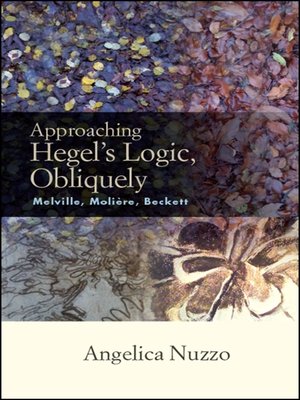Approaching Hegel's Logic, Obliquely
ebook ∣ Melville, Moliere, Beckett · SUNY series, Intersections: Philosophy and Critical Theory
By Angelica Nuzzo

Sign up to save your library
With an OverDrive account, you can save your favorite libraries for at-a-glance information about availability. Find out more about OverDrive accounts.
Find this title in Libby, the library reading app by OverDrive.



Search for a digital library with this title
Title found at these libraries:
| Loading... |
Winner of the 2020 Hegelpd-Prize presented by the University of Padova Research Group
In this book, Angelica Nuzzo proposes a reading of Hegel's Logic as "logic of transformation" and "logic of action," and supports this thesis by looking to works of literature and history as exemplary of Hegel's argument and method. By examining Melville's Billy Budd, Molière's Tartuffe, Beckett's Endgame, Elizabeth Bishop's and Giacomo Leopardi's late poetry along with Thucydides' History in this way, Nuzzo finds an unprecedented and productive way to render Hegel's Logic alive and engaging. She argues that Melville's Billy Budd is the most successful embodiment of the abstract movement of thinking presented in Hegel's Logic, connecting Billy Budd's stutter to the puzzlingly inarticulate beginning of Hegel's Logic, "Being, pure Being," identical with "Nothing," and argues that the Logic serves as an especially appropriate tool for understanding the sudden violent action that strikes Claggart dead. Through these and other readings, Nuzzo finds a fresh way to address interpretive issues that have remained unresolved for almost two centuries in Hegel scholarship, and also presents well-known works of literature in an entirely new light. This account of Hegel's Logic is framed by the need for an interpretive tool able to orient our understanding of the contemporary world as mired in an unprecedented global crisis. How can the story of our historical present—the tragedy or the comedy we all play parts in—be told? What is the inner logic of our changing world?
In this book, Angelica Nuzzo proposes a reading of Hegel's Logic as "logic of transformation" and "logic of action," and supports this thesis by looking to works of literature and history as exemplary of Hegel's argument and method. By examining Melville's Billy Budd, Molière's Tartuffe, Beckett's Endgame, Elizabeth Bishop's and Giacomo Leopardi's late poetry along with Thucydides' History in this way, Nuzzo finds an unprecedented and productive way to render Hegel's Logic alive and engaging. She argues that Melville's Billy Budd is the most successful embodiment of the abstract movement of thinking presented in Hegel's Logic, connecting Billy Budd's stutter to the puzzlingly inarticulate beginning of Hegel's Logic, "Being, pure Being," identical with "Nothing," and argues that the Logic serves as an especially appropriate tool for understanding the sudden violent action that strikes Claggart dead. Through these and other readings, Nuzzo finds a fresh way to address interpretive issues that have remained unresolved for almost two centuries in Hegel scholarship, and also presents well-known works of literature in an entirely new light. This account of Hegel's Logic is framed by the need for an interpretive tool able to orient our understanding of the contemporary world as mired in an unprecedented global crisis. How can the story of our historical present—the tragedy or the comedy we all play parts in—be told? What is the inner logic of our changing world?






